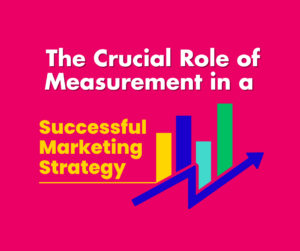The Crucial Role of Measurement in a Successful Marketing Strategy
Marketing isn’t a one-size-fits-all venture. Each business has its unique objectives, calling for a custom-made approach to strategy development. On top of that, there exists a fundamental need vital for marketing success: MEASUREMENT.
Measurement bolsters the foundations of successful marketing by providing invaluable insights into campaign efficacy and areas requiring improvement. It serves as a guide, highlighting how efforts to drive traffic to your website are performing, and how efforts to funnel visitors to take desired actions are playing out.
Making Informed Decisions with Data
The abundance of insights from marketing reports enables informed decision-making, and the true value of data is realized when they are translated into actionable initiatives that drive positive changes and improve marketing outcomes.
Through measurement, you can see if your strategies are working the way you want them to, and where to improve to achieve marketing success.
Improved ROI
Analyzing marketing campaigns helps businesses identify successful aspects and areas needing improvement. Studies from McKinsey & Company show that using analytics in your strategy can increase marketing returns by up to 20%.
Start with Achievable Goals.
Remember In the early stages of adopting measurement analytics, the sheer volume of information can be overwhelming. Begin by applying analytics to one or two marketing activities before expanding your efforts.
Digital Marketing Performance Assessment Tools
Having a reliable platform for reporting is crucial, pulling together data from various sources like website traffic, page views, ad campaign stats (such as impressions, clicks, conversions), and social media engagement metrics (like post interactions, video views, likes, and reach). Check out these popular tools for measurement:
Google Analytics
Known for its extensive features, Google Analytics goes beyond basic metrics. It’s easy to access and free to sign up, making it essential for businesses of any size. Setting up an account and linking it to your website with a tracking code allows you to track metrics such as page visits, event actions, and eCommerce transactions.
Google Tag Manager (GTM)
GTM simplifies the process of adding tracking scripts for various digital campaigns, reducing concerns about website loading times. It also consolidates digital ad tracking data into one easy-to-manage container.
Google Search Console (GSC)
Similar to Google Analytics, GSC helps monitor website SEO performance, providing insights into crawl and index status, search appearance, mobile-friendliness, and security issues.
An Example of how this Data can Improve your Marketing Success
In this scenario, you have been running a Google ad campaign to drive traffic to your website, with the goal of the visitors submitting a lead form on your website.
The campaign has been performing well – you’ve been getting lots of clicks from the correct search terms, but you are hardly getting any form submissions on your website.
By measuring how your website visitors behave once they land on your website, you will be able to identify where they are falling of the journey you want them to take from landing on a page to submitting a form.
You may find they are not spending enough time on the desired page to get through the entire journey; they are immediately leaving the page when the don’t see what they were looking for; or they are viewing the form but not submitting it.
This could mean that the content of the page it’s self needs to be adjusted and improved to raise the frequency of form submissions; the form needs a softer approach for them to feel comfortable in submitting it; or an incentive needs to be added to encourage them to submit the form.
These insights will ultimately help your strategy achieve its goal and stop you from wasting money on an unsuccessful campaign.
Need help is measuring and analysing your marketing efforts? We are here to help! Contact us today.





